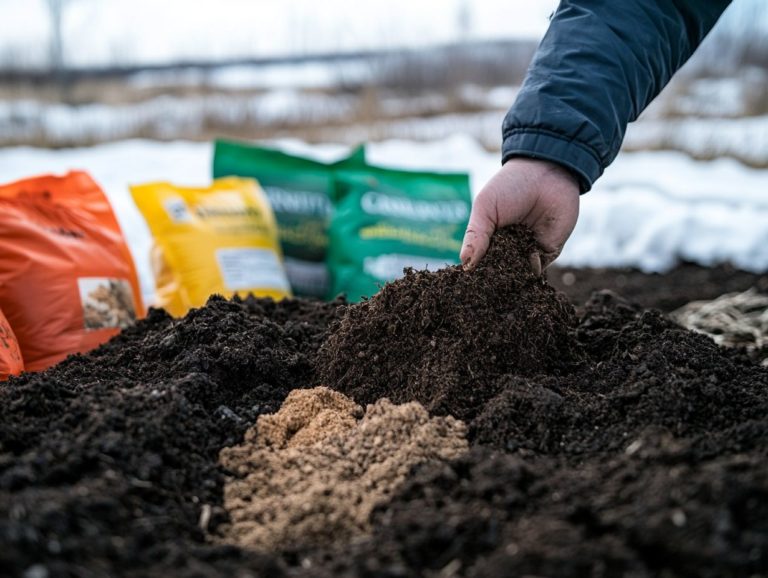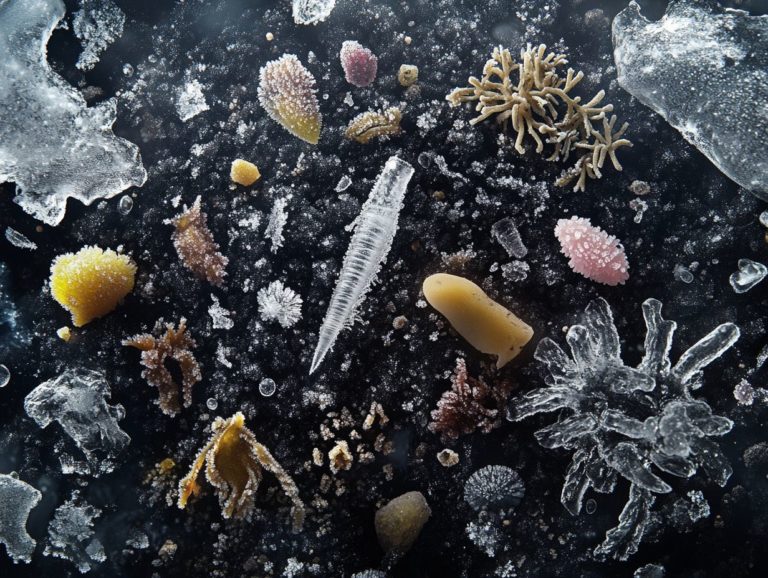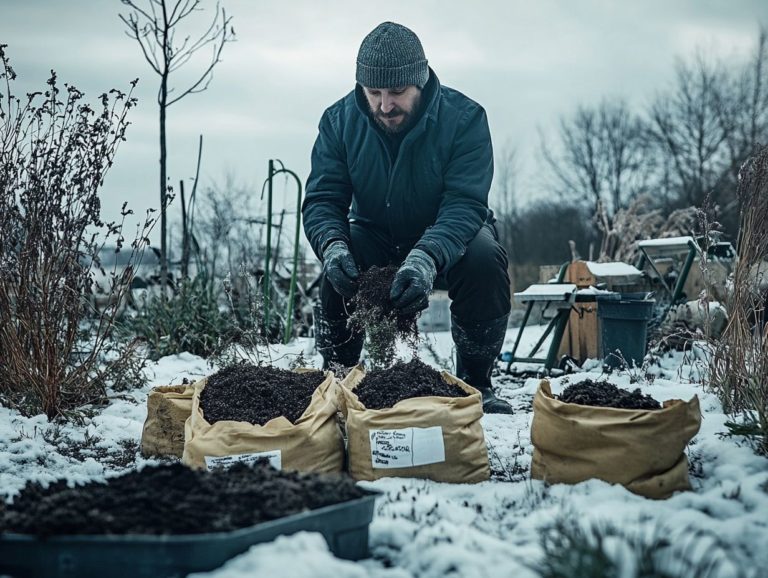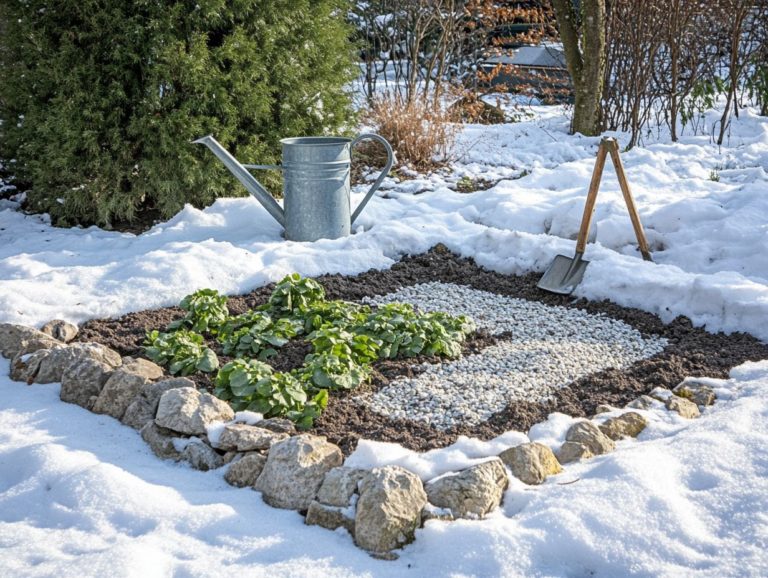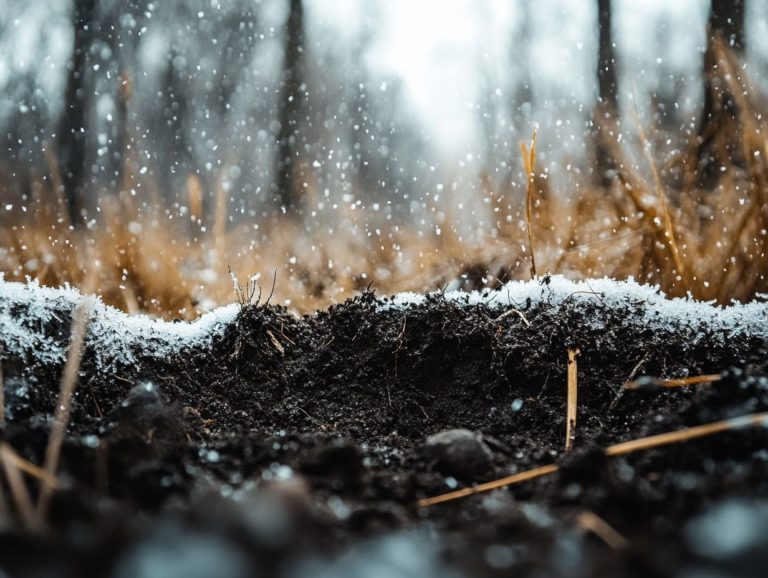Top 10 Soil Amendments for Cold-Weather Gardens
Winter is coming, but your garden doesn’t have to suffer! As the temperatures drop, keeping your plants vibrant can be a challenge. The key to overcoming this hurdle lies in healthy soil, which can be greatly improved with the right amendments.
Discover the top 10 soil amendments that are especially beneficial for cold-weather gardens, from rich compost to nutrient-packed seaweed. These enhancements boost plant health, improve soil drainage, and supply essential nutrients, ensuring your garden continues to thrive even in the chilly embrace of winter.
Contents
- Key Takeaways:
- 1. Compost
- 2. Leaf Mold
- 3. Manure
- 4. Peat Moss
- 5. Vermicompost
- 6. Bone Meal
- 7. Blood Meal
- 8. Greensand
- 9. Fish Emulsion
- 10. Seaweed
- What Are Soil Amendments and Why Are They Important for Cold-Weather Gardens?
- How Do Soil Amendments Benefit Plants in Cold Weather?
- What Are the Key Nutrients Needed for Cold-Weather Plants?
- How Can Soil Amendments Help with Soil Drainage in Cold Weather?
- What Are the Different Types of Soil Amendments and How Do They Work?
- How Can Gardeners Determine the Right Soil Amendments for Their Cold-Weather Garden?
- Frequently Asked Questions
- What are the top 10 soil amendments for cold-weather gardens?
- How does compost help in a cold-weather garden?
- Why is peat moss beneficial for cold-weather gardens?
- What is the role of vermiculite in a cold-weather garden?
- How can bone meal benefit a cold-weather garden?
- What is the recommended usage for kelp meal in a cold-weather garden?
Key Takeaways:
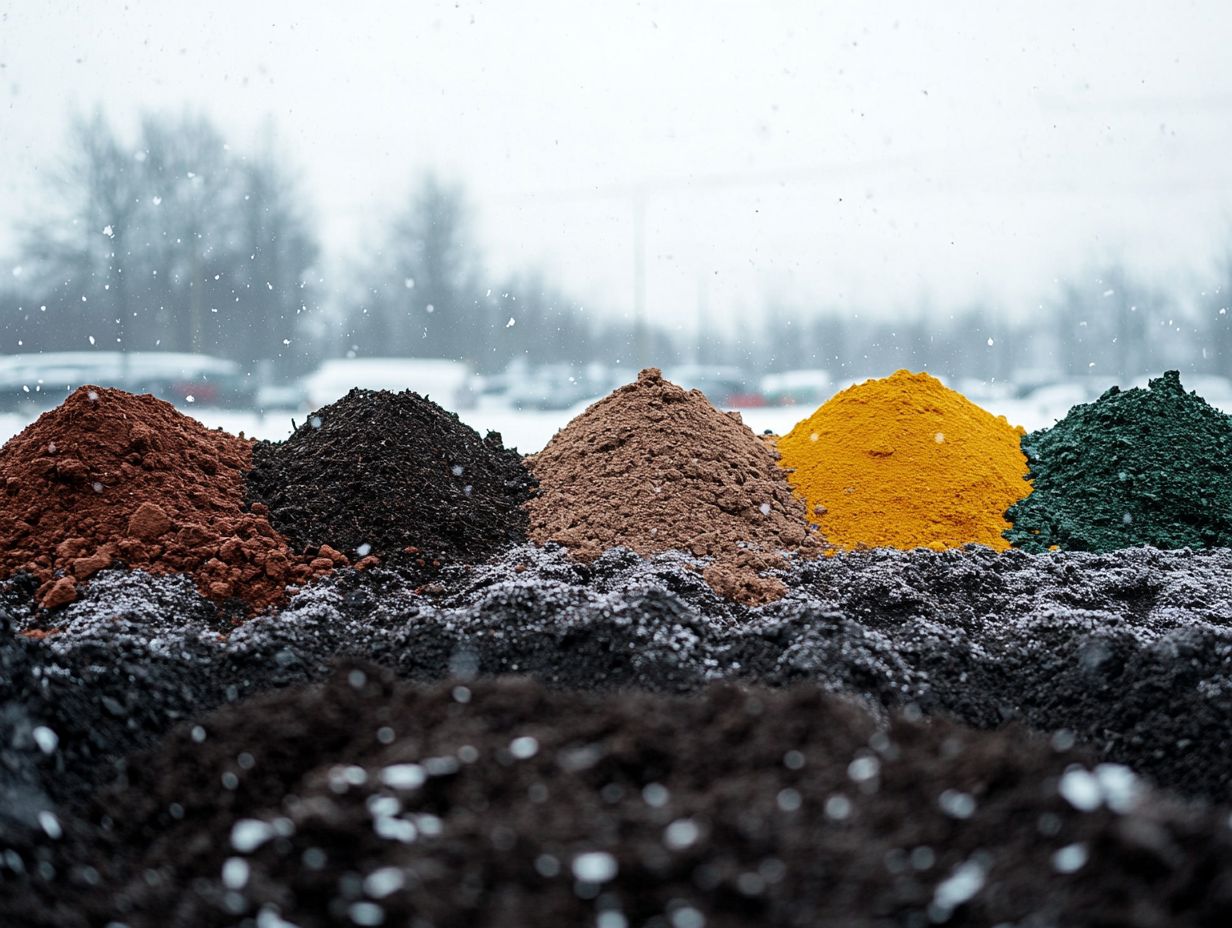
- Use organic amendments like compost and manure to boost your garden’s vitality in winter.
- Incorporate nutrient-rich amendments such as vermicompost, bone meal, and fish emulsion to provide key elements for winter plants.
- Choose soil amendments based on their benefits and your garden’s needs, whether it’s improving drainage or adding nutrients.
1. Compost
Compost is a vital soil amendment that significantly enhances soil health and structure. By enriching the soil with organic matter, helpful tiny creatures, and vital nutrients, it creates an ideal habitat for your plants, whether in a backyard or a winter garden.
This natural process happens when different materials break down into rich soil. You can use kitchen scraps like fruit peels, coffee grounds, and eggshells, along with yard waste such as grass clippings and leaves. By blending these materials, you create a nutrient-dense environment that not only boosts soil fertility but also supports a variety of beneficial organisms, including earthworms. These remarkable creatures aerate the soil and help with water infiltration.
The composting process elevates nutrient levels, leading to healthier plants that thrive in this rich soil. Ultimately, this contributes to a vibrant and sustainable garden ecosystem, where every element works together to promote growth and vitality.
2. Leaf Mold
Leaf mold is a treasure trove of organic goodness created from the breakdown of fallen leaves. It plays a crucial role in enhancing your soil’s health by boosting moisture retention and nutrient levels.
This natural amendment is essential for improving soil structure. When you add leaf mold to your soil, you ll notice better aeration and reduced compaction, making it easier for plant roots to grow.
Creating this valuable compost is straightforward: gather a variety of leaves, pile them in a shady spot, and let nature work its magic over several months up to a year. As the leaves break down, they transform into a spongy material that effectively combats soil erosion, retaining moisture and nutrients while promoting healthier plant growth.
3. Manure
Manure is a powerful organic amendment that enriches your soil with nitrogen, organic matter, and essential nutrients, fostering strong plant growth in both backyard gardens and larger agricultural practices.
You ll find that different types of manure such as cow, chicken, and horse each bring unique nutrient profiles. To maximize their effectiveness, it s crucial to compost or ensure these varieties are well-rotted before application. This process transforms raw waste into a balanced product, significantly reducing the risk of pathogens and unpleasant odors.
Incorporating organic matter into your soil offers profound benefits. It promotes the growth of nitrogen-fixing organisms, enhancing soil fertility and improving overall soil structure. Ultimately, this practice not only nourishes your plants with vital nutrients but also attracts helpful tiny creatures, leading to a healthier and more vibrant garden ecosystem.
Get started today, and watch your winter garden flourish!
4. Peat Moss
Peat moss is a remarkable organic amendment, celebrated for its exceptional moisture retention abilities that enhance soil structure and overall garden health, especially in cold-weather gardens.
This unique material works wonders for both sandy and clay soils. It breaks up compacted clay to improve drainage while giving sandy soils the necessary substance to hold onto moisture and nutrients. When you incorporate peat moss into your garden supplies, you re not just helping plants grow; you re also fostering healthier root systems, leading to flourishing vegetation.
However, it s essential to consider how peat moss harvesting affects our planet, as it raises concerns about habitat disruption and carbon release. Embracing sustainable practices, such as permaculture, is vital to reap the benefits of this organic amendment without incurring a greater ecological cost.
5. Vermicompost
Vermicompost is crafted through the digestion of organic matter by earthworms. This nutrient-rich soil amendment significantly enhances soil health by elevating nutrient levels and fostering beneficial microorganisms.
This method stands apart from traditional composting, which relies primarily on the natural decomposition of organic materials through bacteria. By utilizing earthworms, you can produce a consistently superior amendment that improves soil structure, making it more aerated and better at retaining moisture.
This enriched environment attracts beneficial insects and pollinators, leading to increased productivity and vibrant plant life, enriching the overall biodiversity of your backyard ecosystem.
6. Bone Meal
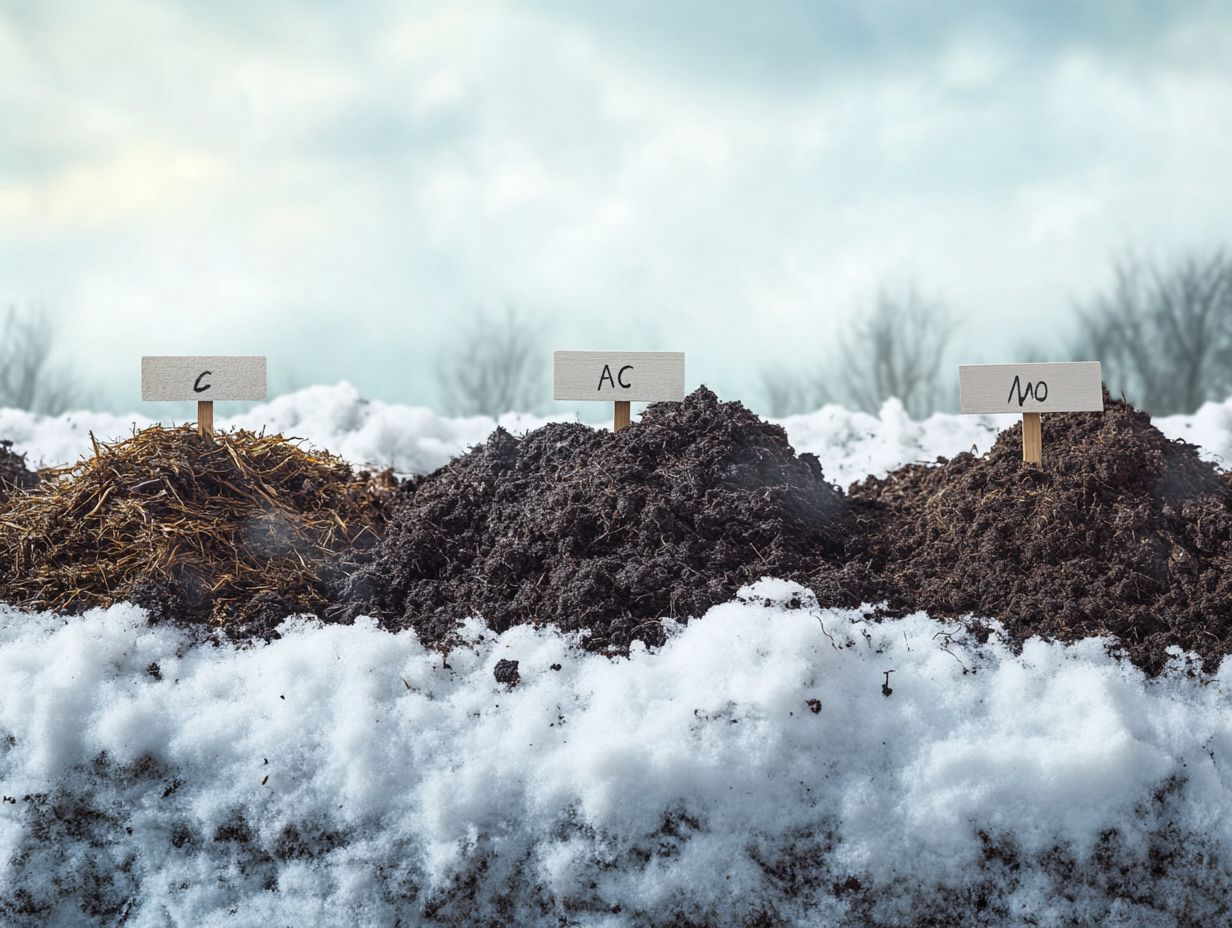
Bone meal is an exceptional organic amendment, packed with phosphorus. This nutrient is crucial for robust root development and abundant flower production, setting the stage for vibrant plant growth.
This natural fertilizer nurtures strong root systems and encourages flowering and fruiting in various plants. If you’re looking to elevate your harvests, it s an outstanding choice.
When applying bone meal, mix it into the soil before planting. This allows the nutrients to break down and become available for your plants. Certain varieties, like tomatoes, roses, and root vegetables, thrive with added phosphorus, showcasing increased vitality and blooming potential.
By enriching your soil with this nutrient-dense amendment, you re ensuring your plants have everything they need to flourish and reach their fullest potential.
7. Blood Meal
Blood meal serves as a fast-acting organic nitrogen source that significantly elevates nitrogen levels in your soil, making it an exceptional amendment for fostering vigorous plant growth.
A common recommendation for application rates is to use about one to two pounds per 100 square feet. This can be tailored based on soil tests and the specific needs of your plants. Compared to other nitrogen sources like urea or composted manure, blood meal delivers a concentrated dose, often resulting in quicker outcomes.
However, it s crucial to apply it judiciously, especially in winter gardens, where over-application could jeopardize your more delicate plants.
For optimal results, consider applying blood meal just before planting or mixing it into the soil well in advance of the cold season. This approach enhances nutrient absorption and promotes robust growth while minimizing the risk of nitrogen burn.
8. Greensand
Greensand is a nutrient-rich soil additive that provides essential potassium while improving soil structure. It is an exceptional choice for enhancing nutrient availability in your gardening endeavors.
Derived from ancient ocean deposits, this natural material is particularly effective in enriching sandy and clay soils. You will love greensand for its potassium content and its impressive ability to enhance moisture retention an essential factor for healthy plant growth.
This mineral plays a vital role in reducing soil erosion losing the top layer of soil crucial for plant growth and compaction, which facilitates better air circulation and root development. By incorporating greensand into your soil management practices, you can significantly boost your garden’s health and vibrancy, paving the way for a more resilient and productive garden ecosystem.
9. Fish Emulsion
Fish emulsion is a nutrient-rich liquid fertilizer made from fish by-products. It offers a treasure trove of organic nutrients that support vibrant plant growth and enhance soil health across various gardening endeavors.
When used correctly, fish emulsion dramatically boosts soil fertility by providing essential macronutrients like nitrogen, phosphorus, and potassium, along with vital trace minerals crucial for plants’ overall vitality. By incorporating this organic fertilizer into your gardening routine, you supply your plants with the nourishment they need for robust growth, while cultivating a flourishing ecosystem within the soil.
Fish emulsion encourages beneficial microorganisms that play a pivotal role in breaking down organic matter, thereby increasing nutrient availability. This symbiotic relationship enhances soil structure and vitality, ensuring your plants can access everything they need to thrive sustainably.
10. Seaweed
Seaweed is your go-to natural soil amendment, brimming with essential micronutrients and growth stimulants. It elevates soil health and encourages robust plant growth, whether in cold-weather gardens or eco-friendly gardening.
By incorporating this marine treasure into your soil, you ll significantly enhance its structure, making it more aerated and capable of retaining moisture. This creates a welcoming environment for root systems to flourish while promoting the activity of beneficial microorganisms.
These microbes are essential for nutrient cycling, the process of nutrients moving through the soil, and decomposition. This effectively boosts overall soil fertility. Seaweed also serves as a natural barrier against pests and diseases, reducing your reliance on synthetic fertilizers and steering you toward a more eco-friendly approach to gardening and agriculture.
What Are Soil Amendments and Why Are They Important for Cold-Weather Gardens?
Soil amendments are essential for enhancing the quality of your cold-weather garden. They enrich your soil with organic matter, boost nutrient levels, and promote overall soil health, ensuring your plants thrive despite winter challenges. For the best results, consider using one of the top 5 soil test kits for cold-weather gardening.
By incorporating materials like compost, well-rotted manure, and peat moss, you can significantly improve soil structure. This allows for better aeration and moisture retention. Certain amendments, such as legume cover crops, support nitrogen fixation, naturally enriching the soil and reducing your reliance on chemical fertilizers. This not only benefits your plants but also contributes to long-term soil fertility.
These amendments are vital for minimizing soil erosion and compaction, which can be particularly harmful in colder climates. Unpredictable freeze-thaw cycles can affect root systems. With these improvements, your plants will establish a stronger foundation, leading to healthier gardens that can withstand winter’s setbacks.
How Do Soil Amendments Benefit Plants in Cold Weather?
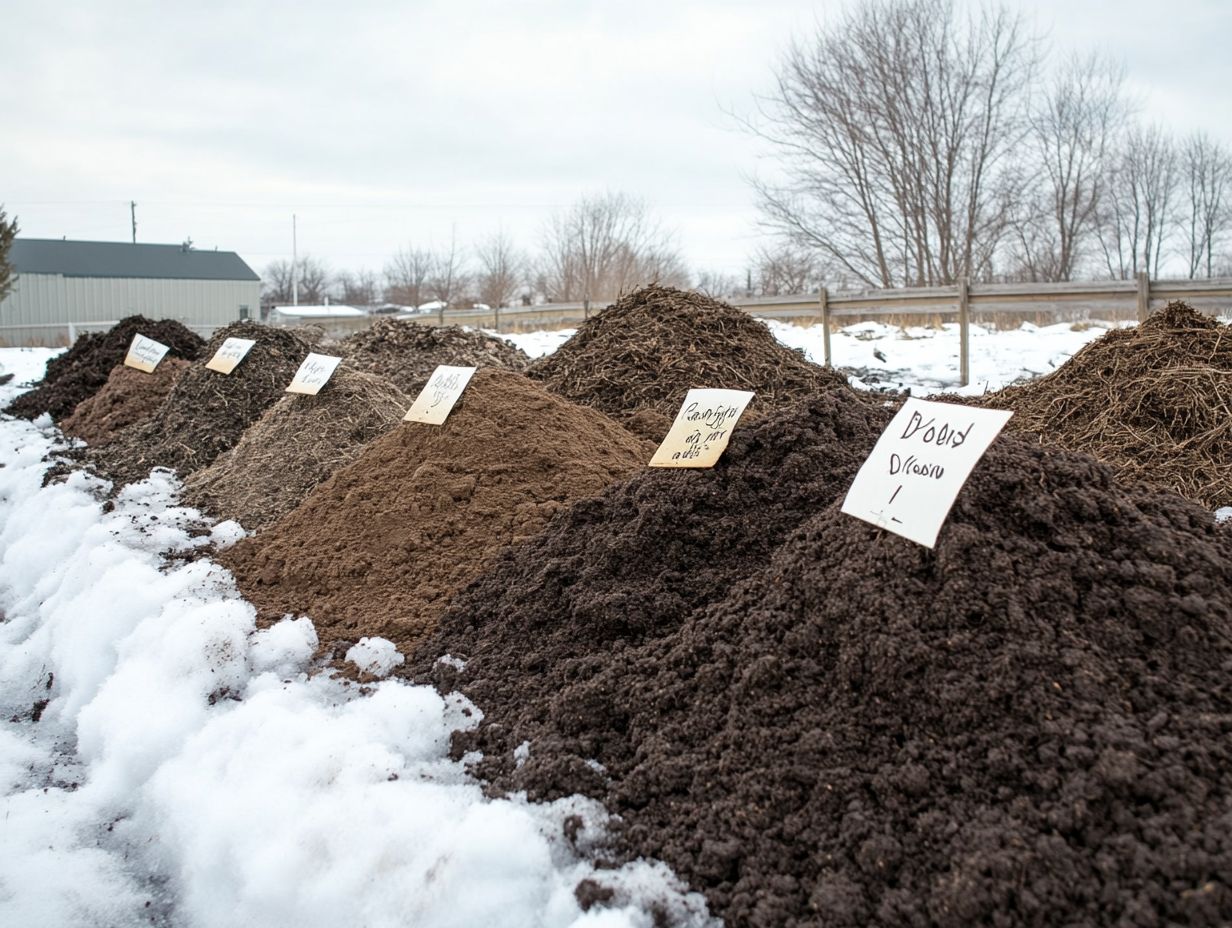
Soil amendments offer substantial benefits to your plants during the colder months by enriching nutrient levels, enhancing moisture retention, and increasing soil organic matter. For those gardening in chilly environments, considering the top 5 planters for cold-climate gardening can also contribute to strong root systems.
These improvements are critical for shielding your plants from temperature fluctuations that often accompany winter. Maintaining a more stable soil temperature helps prevent root freeze and encourages healthier growth.
Effective soil drainage is another essential factor. It keeps waterlogging at bay, which can cause root rot and other troublesome issues. With well-structured soil, your plant roots can access oxygen and nutrients more efficiently, allowing them to thrive even in challenging winter conditions.
Ultimately, this comprehensive enhancement of your plants resilience is vital for ensuring they flourish when warmer seasons roll around.
What Are the Key Nutrients Needed for Cold-Weather Plants?
Cold-weather plants require key nutrients such as nitrogen, phosphorus, and potassium to truly thrive. Understanding what fertilizers work best in cold-climate gardens is essential for enhancing soil health and promoting robust growth during winter.
Each nutrient plays a specific role: nitrogen supports leafy growth, phosphorus aids in root development, and potassium boosts overall plant resilience against harsh elements.
Incorporate organic matter like compost or well-rotted manure into the soil to ensure these vital nutrients are readily available. This will significantly improve the soil’s nutrient content and structure. Bone meal offers a slow-release source of phosphorus, while greensand is an excellent choice for increasing potassium levels.
By strategically amending the soil, you can create an optimal environment for cold-weather plants, enabling them to flourish even in chilly conditions, as detailed in our guide on understanding soil needs for cold-climate plants.
How Can Soil Amendments Help with Soil Drainage in Cold Weather?
Soil amendments are essential for enhancing drainage during colder months, as they improve soil structure and boost organic matter content. This is particularly important in preventing waterlogging and root rot.
In your winter gardens, where soil conditions can become tricky due to freezing and thawing cycles, these enhancements are invaluable. Incorporate materials such as compost, peat moss, or perlite to significantly improve the soil’s capacity to retain air and water, all while promoting robust root development.
Gypsum can also work wonders by breaking up compacted clay soils, facilitating better drainage. As you tend to your plants during the chillier months, consider their specific needs to ensure they thrive in a well-drained environment that supports their growth, even when temperatures take a dip.
What Are the Different Types of Soil Amendments and How Do They Work?
Various types of soil amendments, such as compost, manure, and peat moss, are your allies in improving organic matter, enhancing nutrient levels, and promoting overall soil health. This not only benefits your plants but also elevates your gardening game.
Each amendment brings unique advantages tailored to meet your gardening needs. For instance, using compost adds essential nutrients while boosting tiny organisms that help plants grow, vital for nutrient uptake in your vegetables and herbs.
Manure, loaded with nitrogen, supports lush leafy growth, making it perfect for vibrant leafy greens and fruiting plants. Meanwhile, peat moss enhances water retention and aeration, making it especially beneficial for acid-loving plants like blueberries and azaleas.
By understanding the specific roles these amendments play, you can make informed choices that lead to thriving, healthy plants in your garden.
Start amending your soil today to give your plants the best chance this winter!
How Can Gardeners Determine the Right Soil Amendments for Their Cold-Weather Garden?
You can determine the ideal soil amendments for your cold-weather garden by conducting soil tests. These tests assess nutrient levels, pH, and organic matter content to ensure the best conditions for growth. For the best options, check out the top 5 soil test kits for cold-climate gardens.
Start by collecting soil samples from various spots in your garden, typically at a depth of 6 to 8 inches. Once you ve gathered your samples, mix them thoroughly to create a representative sample. This blend can then be sent to a local agricultural extension service or tested with a home testing kit.
When the results come in, it s essential to interpret them accurately. Understanding nutrient deficiencies helps you choose the right amendments. By correlating these results with the specific needs of your plants and the characteristics of your local soil, you can make informed decisions that ensure your plants receive all they need for robust growth.
Frequently Asked Questions
What are the top 10 soil amendments for cold-weather gardens?
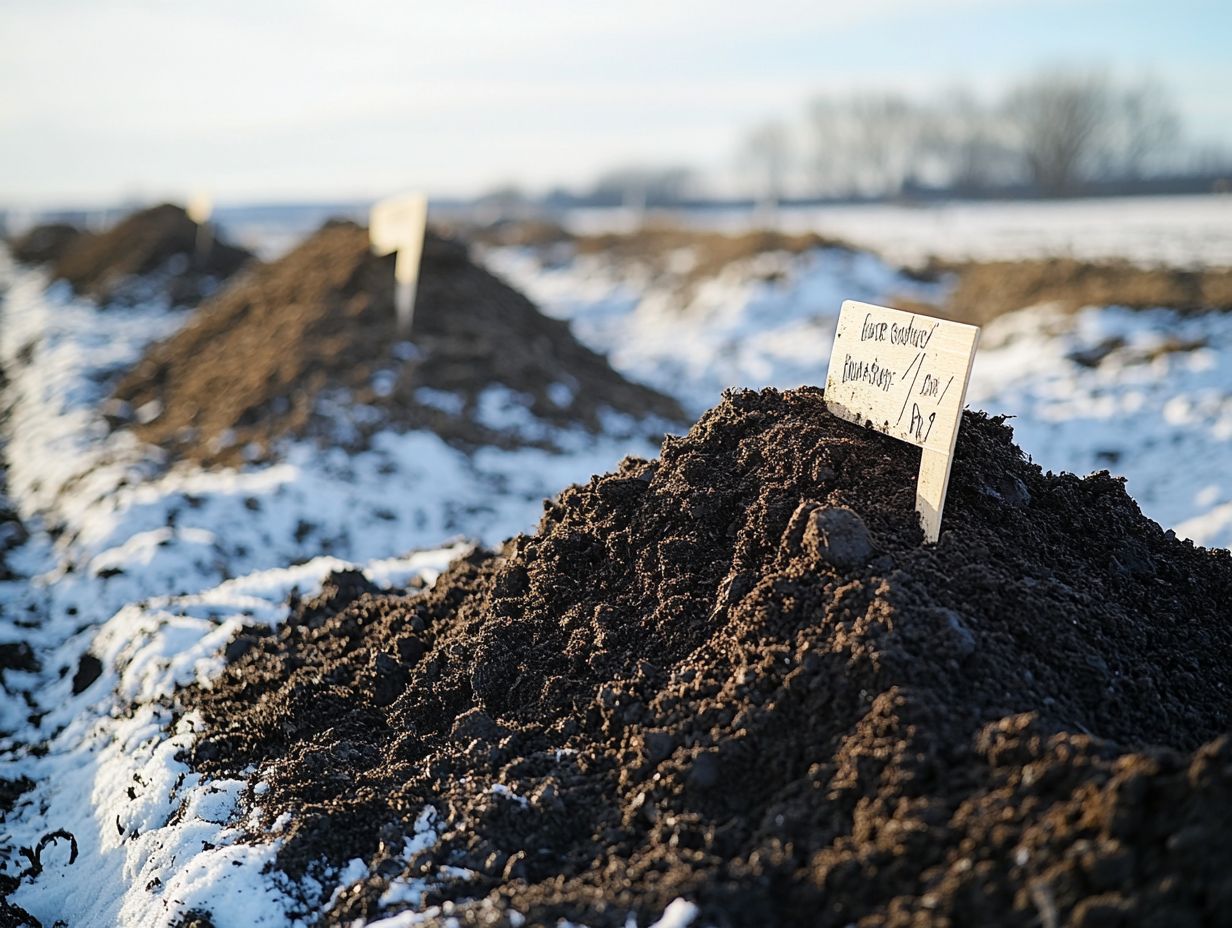
The top 10 soil amendments for cold-weather gardens are compost, manure, peat moss, vermiculite, perlite, bone meal, blood meal, fish emulsion, kelp meal, and rock phosphate.
How does compost help in a cold-weather garden?
Compost is essential for a cold-weather garden. It provides valuable nutrients and organic matter, improving soil health and structure. To learn more about what soil works best, check out this guide on the best soil for cold-climate gardens.
Additionally, it helps retain moisture and regulates soil temperature, making it an ideal amendment for cold-weather gardens.
Why is peat moss beneficial for cold-weather gardens?
Peat moss has a high water-holding capacity. It helps improve soil drainage, which is important in cold-weather gardens where excess moisture can lead to soil compaction and root rot.
What is the role of vermiculite in a cold-weather garden?
Vermiculite is a lightweight mineral that improves soil aeration and water retention. This is particularly useful in cold-weather gardens where heavy, compacted soil can prevent root growth and inhibit plant development.
How can bone meal benefit a cold-weather garden?
Bone meal is a natural source of phosphorus, an essential nutrient for plant growth. In cold-weather gardens, where plants may have a harder time accessing nutrients due to lower soil temperatures, bone meal can provide a boost for healthier and stronger plants.
What is the recommended usage for kelp meal in a cold-weather garden?
Kelp meal is a rich source of trace minerals. It is recommended to use kelp meal as a top dressing or in a liquid fertilizer form for cold-weather gardens to provide a slow-release source of nutrients throughout the growing season.
Start testing your soil today and give your plants the nutrients they deserve!

